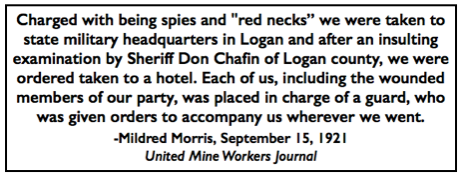 —————
—————
Hellraisers Journal – Friday September 16, 1921
Mildred Morris Describes Her Sojourn into the Battle Zone of West Virginia
From the United Mine Workers Journal of September 15, 1921:
HUNTINGTON , W. Va .– Four newspaper correspondents who have the memorable experience of penetrating the mountainous regions where war between the miners and state police has been raging for nearly two weeks and being the first to obtain an eye-witness picture of the firing line, are alive tonight by the grace of God.
As a member of the party I arrived here after escaping from Logan, where the four of us had been placed under guard.
Under a shower of bullets from both sides we convinced ourselves that war–real war-has been going on in West Virginia.
Three times a fusillade of steel bullets poured on us from the Springfield rifles of the state gunmen and three times we were fired on by the miners.
And after it was all over we were taken with our wounded to Logan, under guard.
Boyden Sparkes, of the New York Tribune, was shot through the leg and a bullet all but penetrated his scalp. One of the miners whom we had persuaded to act as a guide was shot in the ankle and is seriously wounded. When we were able to convince the state police, whose lines we had penetrated, that we were non-combatants merely on a sightseeing tour all military operations ceased while officers stared at us in amazement and asked:
“How in h–-l we had got there and what we meant?”
Military passes we presented from General Bandholtz, representative of the War Department, and commander of the United States troops now in the war zone were scorned.
“We don’t know nothing about him. Nobody has told us federal troops are here and we haven’t seen them, so we don’t know nothing about them,” the young officer in charge informed us.
Charged with being spies and “red necks” we were taken to state military headquarters in Logan and after an insulting examination by Sheriff Don Chafin of Logan county, we were ordered taken to a hotel. Each of us, including the wounded members of our party, was placed in charge of a guard, who was given orders to accompany us wherever we went.
For more than three hours I was subjected to indignities by this guard and other members of the state police.
Only after frantic appeals Mr. Sparkes was permitted to communicate with his office in New York in order that his wife might know he was not seriously injured. None of the rest of us was permitted to establish our identity and our passes from General Bandholtz were received with the same scorn by Sheriff Chafin and his attaches as the officers of the state police on the battle front had shown. My guard, an insolent youth, insisted on going with me into the bedroom assigned to me. When I objected he said he was acting under orders. To avoid this indignity, I was compelled to sit in the hotel lobby while more insolent and youthful members of the state police made insolent queries and threatened me if I refused to answer.

